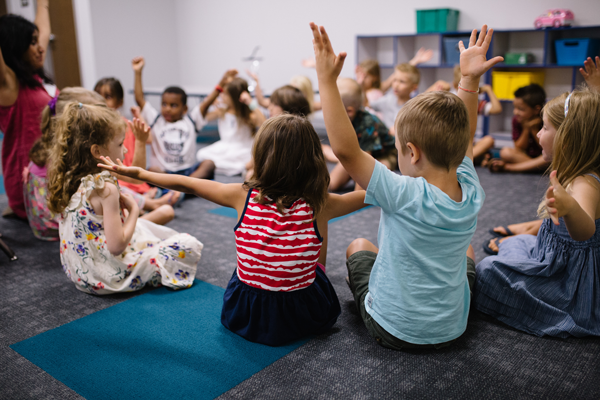
Classroom Management—Who’s in charge around here, anyway?—
Besides the children pushing around toy cars and building towers with blocks, three other things are always at play in our classrooms: the effects of sin, the effects of the work of grace, and the hope of supernatural power. When things are going rough, too often we only see the effects of sin and forget the other two. So before using any of the practical tips in this blog, please pray for your children, your helpers, and for yourself to be filled with grace to help us teach, respond, and react according to the Spirit who is at work within us.
Good classroom management begins with the teacher. Planning and organizing prevents many problems before they start. The first important element is arriving to your classroom first—before any student. This way you have time to set up arrival activities and greet each student who comes in. If children arrive before you, they will start activities/toys/games that you might not have planned on. Right away you’re facing a problem because they have chosen things they don’t want to put away when you’re ready to start what you have planned.
Arrival activities are important. Make sure to have them ready so that as soon as students come in the room they can join in. For preschoolers, it’s effective to have a variety of centers they can choose from. For elementary, review last week’s lesson with a game that’s easy for students to join as soon as they arrive. With preteens and teens you might have a fun question of the week to ask, which gives them an opportunity to interact with you and other students. Whatever the arrival activity, be ready to go as soon as the first student enters. Of course, there will be days when you are running behind, so ask the first arrivals to help you set up the activities in those cases.
When you are giving instructions for classroom activities make sure the directions are clear and easily understood by whatever age you are teaching. For example, with preschoolers you might say, “Boys and girls, please put down your crayons, put away your toys, and join me on the story rug.” Clear and understandable.
Make simple classroom rules and post them on the wall, even if your children don’t read. I know that sounds crazy, but if you have them on a wall poster and point to them and read them every week, children begin to clearly understand the rules of your classroom. Simple rules mean less than five and they could be as basic as:
- Use your inside voice.
- Don’t run inside.
- Don’t touch anyone unkindly. (You might give examples to help them understand—hit, pinch, bite.)
- Don’t take something from someone else (crayon, marker, toy, book).
Monitor what your students are doing as they participate in activities. Stop trouble before it starts. It seems I always have one who is a perfectionist and I know this because they tear up a paper and start over. Gently remind them that we only have so much time today but that you have an extra paper they can take home if they want it. This forestalls the meltdown when they haven’t finished the activity in the time given.
Expect good classroom behavior and kids will often live up to what you expect. All of this may seem overwhelming, but these are simple things that can make a world of difference. Remember, start with prayer for each of your children.
To watch a short video on this topic visit our website HERE.

B.A. Snider has more than 20 years’ experience as a children’s director in churches ranging in size from 200 to 4,000 but finds her passion is the same no matter how many children she’s serving. Show the children Jesus. Teach the kids all of the Bible so they see that the stories from the Old Testament point to Jesus and that the New Testament shows how Jesus fulfilled God’s promises—yesterday, today, and forever. B.A. began her formal ministry as a children’s director and consultant in 1993, but she has taught and led music for children since she was in junior high school. She earned her bachelor’s and master’s degrees from the University of Tennessee and taught college until the Lord called her to seminary and full-time ministry. She graduated with a master’s degree in Christian Education from Columbia International University. Speaking at conferences, consulting with leadership, and training teachers brought her to Great Commission Publications (www.gcp.org) in 2014 as the Children’s Ministry Consultant and Marketing Director.
